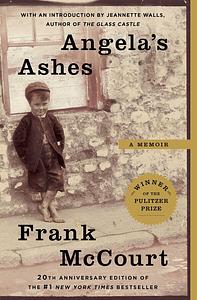You need to sign in or sign up before continuing.
Take a photo of a barcode or cover
reflective
sad
slow-paced
emotional
reflective
sad
medium-paced
This is hands down the best book I’ve ever read. I laughed, cried, and read it twice. Wow!
This is an autobiographical book. The story of Frank McCourt's childhood is shocking and pitiful. He writes with humor and sensitivity.
This book is reviewed on my Rory Gilmore Reading Challenge site: https://rorygilmorereadingchallenge.wordpress.com/2015/09/18/book-8-angelas-ashes/
Frank McCourt describes his life from birth until he is about twenty. He is born in the US, both of his parents are Irish. They live in extreme poverty, often not having enough food. When he is four, during the depression, his family of six go back to Ireland. They settle in Limerick. His father goes on the Dole and works sporadically. More often than not, he takes the money he gets to the pub and leaves his family hungry. Later, during the War, he goes to England to work in a munitions factory. However, he never sends home any money and the family lives in squalor. Frank goes to school until the age of 14, when he gets a job as a Telegram Boy and later works for a company that distributes magazines. When he is twenty, he goes back to the US.
What features most in the book is the ever-present poverty. The protagonist and his family live from one day to the next, hoping that they will have enough money for the next meal. The church also plays a big role in the education of the children. The people really believe in Heaven, the State of Grace, Confession and Hell.
The book is well written and engaging.
What features most in the book is the ever-present poverty. The protagonist and his family live from one day to the next, hoping that they will have enough money for the next meal. The church also plays a big role in the education of the children. The people really believe in Heaven, the State of Grace, Confession and Hell.
The book is well written and engaging.
challenging
emotional
sad
tense
medium-paced
Graphic: Alcoholism, Racism
Moderate: Child death, Sexual content
McCourt has done his country justice. The style of his writing is incredible; he somehow writes like a four year old and a poet simultaneously. I can't stress enough how wonderful something like that is to read. He also includes the most interesting little thoughts, ones that only a child would have, like how he doesn't understand why people need to sing other people's songs. His character's inner thinking becomes more focused as the book progresses--you can literally feel him getting older. I will say that parts were a little repetitive, but I suppose if you read the other two books the pacing makes more sense. It took 250 pages to go from ages four to eleven and another 100 for twelve to nineteen, which is a bit of a bummer because his writing about discovering "manhood" and "the excitement" through a religious perspective were so interesting. He also did an incredible job showing the pain that lies in a feud with a family member, where you don't really feel angry as much as you can't bare to look at them. And the way he described the world weighing down on him for a year after he condemned Theresa Carmody to the pits of hell--heartbreaking. Childhood emotions are simply nailed in this book.
My favorite part of the narrative were those days he'd spend in the fields around Limerick, lying under cows and thieving apples off trees. It was the only part that really felt like Frank was happy, that he'd get no comeuppance, because it was the only part where he knew he could get no comeuppance. The farmers weren't as fast as him. End of story. And I can taste the apples and the milk way over here in 2021.
So many interesting ideas, mostly about religion and WW2. So many beautiful scenes, mostly so because of death, poverty, and the sacrilegious wonderings of a child.
I can't believe how much I learned about America from a memoir about an Irish boyhood.
4.5/5
My favorite part of the narrative were those days he'd spend in the fields around Limerick, lying under cows and thieving apples off trees. It was the only part that really felt like Frank was happy, that he'd get no comeuppance, because it was the only part where he knew he could get no comeuppance. The farmers weren't as fast as him. End of story. And I can taste the apples and the milk way over here in 2021.
So many interesting ideas, mostly about religion and WW2. So many beautiful scenes, mostly so because of death, poverty, and the sacrilegious wonderings of a child.
I can't believe how much I learned about America from a memoir about an Irish boyhood.
4.5/5
Probably 3.5 stars, but A LOT of the story took place during his adolescence when he was a bit preoccupied by his “excitement” as he calls it.
I was 13 when Angela's Ashes came out, and I remember people talking about it. I finally got around to reading it, and, even though the first few chapters almost lost me, it really is as good as they say.




